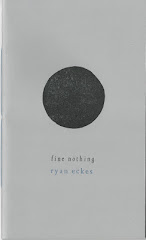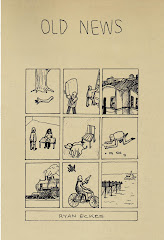Monday, May 10, 2010
poem
we want to say
“common sense”
and cannot
the door torn off
the mouth
hanging
out a car parked
& booted a bankrupt
shopkeeper the very
tongue he preaches
parched & barking
the accident
the poem in me
i believe
til i see it
& then want myself
which is someplace
else thomas paine
recanted nothing
on his deathbed
in a house later
demolished
which today
is a piano bar
called marie's crisis
on grove street
marked w/ a plaque:
citizen of the world
you don't know what
you see
so you love
then break
reaching like a bridge
that cannot be finished
that is not invented
god – this place
doesn’t exist
my friend said of paris
the big empty talk
of museumed people
fifteen-dollar beer
behind red-roped
sidewalk & michael
jackson died the next
day from passing cars
billy jean is not my lover
all day & all night
the mosquitoes eating us up
for the words to say
the buildings
so we could be them
and walk thru our lives
traveling is not
vacationing
in my book
one does not vacate
in my book
opened flat
my father lying
on the floor
counting the churchbells
every hour to the wall
that won’t let him up
as if the final words
we live by were not
already vacating us
fuck the job it’s perfect
you’ll find another one
i’ll write w/ this pen
w/ your name on it
til the ink runs out
then throw it away
& rise to make a toast:
you can have a seat
you can have a drink
you can have a woman
you can have a job
you can have this whole
society that does not
want to move
this cult of final word
this thing that grew
into my heart & died
i get up & walk around it
punt it down the street
then mug somebody for it
eat her flowers, wipe my
ass, flush & close the lid
is that closure?
no, but i’m retired
i’ll be retired my whole life
from you stupid assholes
who believe in jobs
you don’t know what work is
til you wake up
on the ceiling
as shadows of leaves
clawing for tree stumps
lumped in the throat
you thought was yours
it’s a forest for a tongue
from bedrooms i used
to wake up in
it’s a forest for a tongue
to pave a life
up & down
as chewed gum gets
tarred into it here &
there final words
flattened
as they should be
so the wind can be revolution
which is all it is
a street made
of people railed
w/ eyes emptied
of windows, opened
& closed so inside one
i dust the pollen off
my tv w/ an old che
guevara tee shirt
though i have no channels
& almost never watch
movies i can look up
& see myself
on the screen
in black & white
writing this poem
to somebody
& swear i hear
my neighbor’s tv
downstairs tonight
though it can’t be
b/c she’s out of town
i have this note
says i’ll be away
til next friday
fyi (if you see the light)
i have a light
on a timer
Dear Tom Paine,
I admit I’m impressed that your chapbook sold hundreds of thousands of copies. I wonder at how your writing appealed to so many people across the social class spectrum. The success of Common Sense is credited to the force of its imagery, which, situated within simple, direct language that was buffered with biblical allusion, sucked readers into your corner while rendering any other corner so wrong and wretched a place anyone would be a fool to be caught dead in it.
Even your enemies had pretty nice things to say about you. John Adams, for example, who hated your guts, believed that your “utopian conviction” and “brilliant pen” made you the “most dangerous man in America.” Who’s the most dangerous man in America today? Hard to say, but I doubt it’s a writer, whoever it is. Today there is no one like you who wields the same influence, and I think that is why many people say that poetry can’t matter. This letter is about poetry. And the future of our country.
It’s not that more people would want to read poetry if more poets used imagery like yours or used simple, direct language. Plenty already do. Besides, your own writing has been described (by a prominent Paine scholar) as “disjointed, even rambling, amounting to a stream of observations on political events or statements by others . . . which [you] interpreted to [your] own advantage, often disregarding the original speaker’s intentions.” Hmmm. I often find myself doing the same in poetry. But I try to resist interpreting solely to my own advantage—otherwise I learn nothing, and then what’s the point, except for convincing myself that I’m right?
I know that being right is important to you, Tom. That makes you more of a politician than a poet. Maybe you’d disagree, but look: you convinced people of democracy without using the word “democracy” even once in Common Sense—not because you mastered the show-don’t-tell principle of the creative writing workshop, but because “democracy” was a dirty word back then, sort of like “socialism” today—no one would buy it. And, let’s face it, you didn’t believe in any of that Christian nonsense you were spewing. You were pandering. You compromised on truth.
You also used to brag that you didn’t read very much. How true can that be? I mean, come on. Maybe a little John Locke? Or Crèvecœur? Your thinking began somewhere. Your sound came from somewhere. And you believed in dialogue, in the social. You preached it. Yet you wanted to be heard more than you wanted to hear. In that, you may be essentially American. 300 million people now live in the United States, so I doubt what I can say accurately about a country of this size. We are too many to be one, too many for nationalism of any kind to make sense. I’ll say that I live in a society in which people are dying to be heard. Sometimes I wonder who is dying to listen. I write in order to be heard, in order to matter. We 300 million are a society that aches for society, perhaps without truly seeking it. At best, the U.S. consists of various almost-societies; at worst, a collection of crumbling worms seeking to crown themselves.
Would my time be better spent trying further to trace how we have come to be so, or shutting up for hours and hours, days and days and, before saying another word, letting myself become full of sounds and sounds until, finally, singing it all back and seeing what I’m made of?
Sincerely,
RE
Wednesday, May 5, 2010
recording from 4/30, mostly books
(Thanks, again, to the tireless Greg Bem, who, I suspect, is constructing a non-academic counterpart to PennSound. Greg is threatening to leave Philly for Seattle soon. It's time to bombard him with letters threatening him to remain here.)



